Student who dedicated his time at university to helping disabled people graduates
A student who has dedicated his time at UWE Bristol to helping people with disabilities has graduated.
Michael Rose, who graduated in BEng (Hons) Robotics, worked with amputees to develop sockets for prosthetic legs and designed a cup holder for wheelchair users and an easy-to-grasp ice cream cone for dementia patients.
He said: “The motivation through all of this is my drive to want to help people. It’s been about listening to people’s problems and struggles and wanting to be able to put my skills to good use and provide the best support I possibly can.”
During his studies at UWE Bristol, Michael started his own 3D-printing business, built a team of student staff and has seen his research published at international conferences.
The 31-year-old has urged undergraduates and prospective university students to “follow what you want to do” and “grab every opportunity with both hands”.
"The motivation through all of this is my drive to want to help people. It’s been about listening to people’s problems and struggles and wanting to be able to put my skills to good use and provide the best support I possibly can."
UWE Bristol robotics graduate Michael Rose
Inspired to make a move into medical technology after spending time in rehabilitation when serving in the Royal Air Force, Michael joined a robotics degree course as a mature student and become involved in three research projects aimed at designing improved prosthetic sockets for three amputees - Andy Lewis, Tania Goddard and Igor Burkovetskyy.
Tania, who became an above knee amputee in 2012 and had discomfort with sockets provided by the NHS, set Michael and fellow researchers the task of designing a socket that could cope with sweating and different levels of swelling on her upper leg.
She said: “It’s an ongoing project and I still feel hopeful with Mike and the team working on it. It could help all amputees out there. I’m glad someone is listening to us when we say: ‘These are the issues – can you help?’ Mike and the team want to do everything they can.
“In six years, I had 39 sockets from the NHS that did not work. I’ve only walked for the equivalent of eight months in that time - all I want to do just want to get back on my feet again.”

Outside of his academic work, Michael started his own company designing, manufacturing and selling 3D-printed household products called RI Print Hub. He won £17,000 in funding via UWE Bristol’s Student Ventures, enabling him to buy 3D printing equipment, pay wages, and run his own workshop on Frenchay campus. He uses profits to fund the development of disability products.
He made a gyroscopic, self-levelling cup holder that can be attached to a wheelchair after Tania Goddard challenged him to find a solution for carrying hot drinks. He was also contacted by a local hospice, enquiring whether he could identify a solution for dementia patients struggling to properly grip ice cream cones. Michael designed a reusable, hardwearing 3D-printed cone with additional grip to make it easier to hold.
Michael said: “With the cup holder, the aim was a quality of life improvement for wheelchair users so they can move around and not spill drinks on themselves. When I began working with Tania, she asked me to use a wheelchair for a week and doing that opened my eyes to a lot of the problems being faced. As well as not being very effective, the cup holders currently on the market are priced astronomically. We’re trying to produce useful, hardwearing products at an affordable price. We’ll make them available as open source so they can be 3D printed by anyone, anywhere in the world.”
Tania said: “When in a wheelchair, you need arms to push, so carrying anything is practically impossible. One time, I placed a coffee cup in between legs then tried to move and got scolded. Michael’s cup holder is amazing and is a better solution – I have freedom to move around the house and the kids don’t need to panic that I’ll end up in A&E again.
“With every challenge I’ve set Michael, he’s taken on board everything I’ve said. He’s really listened to somebody in a wheelchair - you don’t always get that.”
Michael said: “I get a rush of dopamine when I help people – when I see one of my products being printed on the 3D printer, I get a rush of joy. Helping other people is the reason I am, and I love it.”
The graduate now plans to study for a robotics PhD in South Korea, continuing his work on prosthetics with Tania. His business will continue to run on campus, providing part time work, work experience and personal development for undergraduate students in 3D printing, computer aided design and electronics.
Michael said: “I was told I would never go to university and here I am graduating with a 2:1 in robotics, of all subjects. Don’t listen to people who say you can’t do it. I’ve had to do some resits while I’ve been at university but I’ve not stopped – not once did I think I was going to give up.”
Related news

24 November 2025
UWE Bristol celebrates achievements of thousands of students at Graduation ceremonies
The academic achievements of nearly 3,000 students will be celebrated this week (24-28 November 2025) as UWE Bristol’s autumn Graduation ceremonies take place at the Bristol Beacon.

30 July 2025
Bristol Pride director awarded honorary degree
Daryn Carter MBE, director of Bristol Pride, has been awarded an honorary degree by UWE Bristol in recognition of his service to the LGBTQ+ community in Bristol.
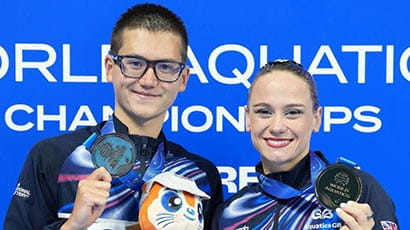
28 July 2025
Student wins bronze medal at World Aquatics Championships on her graduation day
UWE Bristol sports rehabilitation student Izzy Thorpe made waves at the World Aquatics Championships winning a bronze medal in artistic swimming on the same day she was meant to be crossing the stage at her university graduation ceremony.

22 July 2025
Angellica Bell receives honorary doctorate from UWE Bristol
Angellica Bell, a prominent figure on British television and radio, has been awarded an honorary degree by UWE Bristol.

21 July 2025
Fortnight of celebrations begin at UWE Bristol's Graduation ceremonies
The university will celebrate nearly 6,000 graduates at ceremonies running over the next two weeks (21-31 July) at the Bristol Beacon.
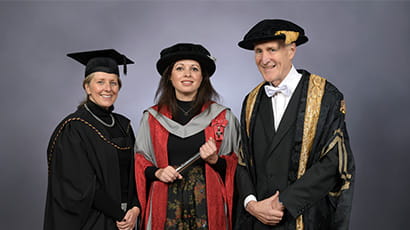
28 November 2024
Entrepreneur and advocate for workplace equality awarded honorary degree by UWE Bristol
Dr Zara Nanu MBE, an innovator in addressing workplace inequalities and tackling the gender pay gap, has been awarded an honorary degree by UWE Bristol.
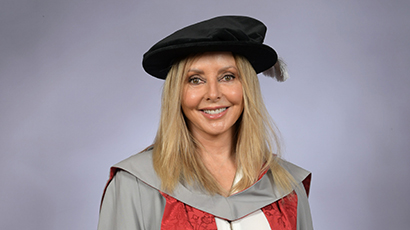
27 November 2024
Carol Vorderman receives honorary doctorate from UWE Bristol
Broadcaster and writer Carol Vorderman MBE has been awarded an honorary degree by UWE Bristol.
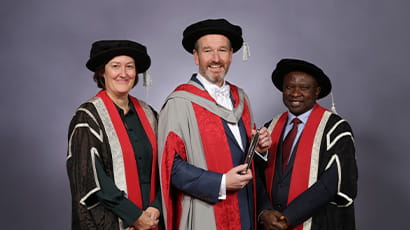
26 November 2024
Bristol learning foundation chief executive awarded honorary doctorate
Steve Taylor, Chief Executive of the Cabot Learning Federation (CLF), has been awarded an honorary doctorate by UWE Bristol.
25 November 2024
Celebrations begin for UWE Bristol’s autumn Graduation ceremonies
Nearly 3,400 students will celebrate their academic achievements at UWE Bristol’s autumn Graduation ceremonies taking place this week (25-28 November) at the Bristol Beacon.
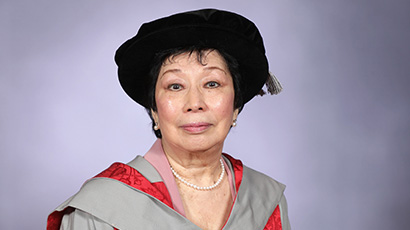
25 July 2024
Extraordinary community work recognised with honorary doctorate
Rosa Hui MBE DL, founder of the Chinese Community Wellbeing Society (CCWS), has been awarded an honorary doctorate by UWE Bristol.
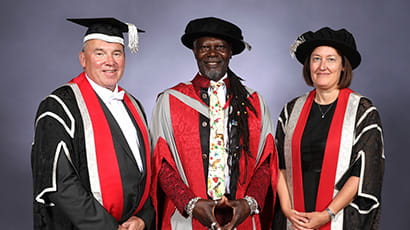
23 July 2024
Entrepreneur Levi Roots shares love for ‘great city of Bristol’ as he collects UWE Bristol Honorary Degree
Entrepreneur Levi Roots has been awarded an Honorary Doctor of Letters by UWE Bristol recognising his commitment to future generations and the city of Bristol.
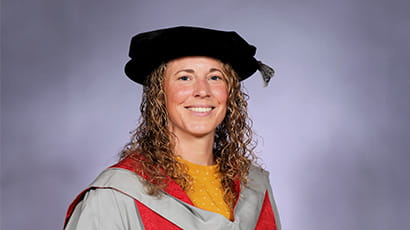
23 July 2024
Bristol Bears player given Honorary Degree for tackling mental health stigma
Bristol Bears rugby player Amber Reed has been given an Honorary Degree by UWE Bristol for tackling mental health stigma in sport.
You may also be interested in
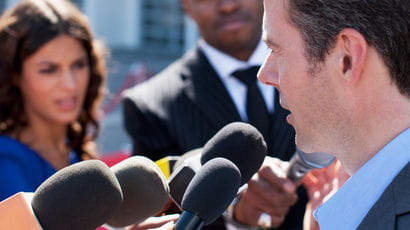
Media enquiries
Enquiries related to news releases and press and contacts for the media team.
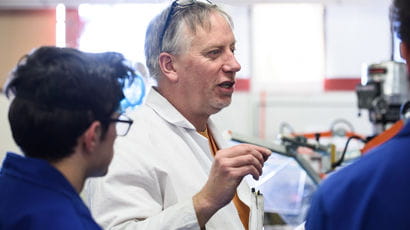
Find an expert
Media contacts are invited to check out the vast range of subjects where UWE Bristol can offer up expert commentary.

Facilities to support careers and enterprise
Facilities on campus to support careers and enterprise including the University Enterprise Zone and Student Ventures.






